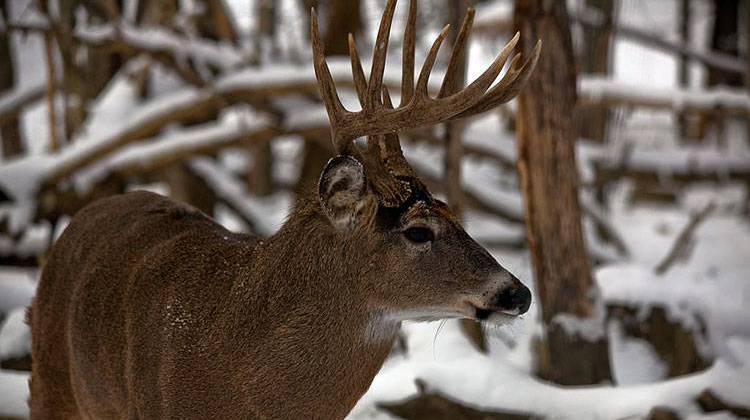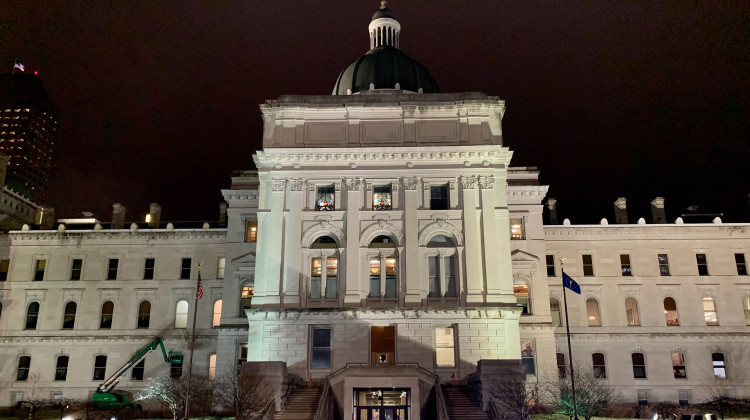INDIANAPOLIS – For the second year in a row, a bill to set restrictions and regulations for fenced hunting operations has been stopped in its tracks on the Senate floor.
On Tuesday, senators voted 27-23 against House Bill 1453 – a bill that would have legalized and regulated an industry that places farm raised cervidae (deer, moose, reindeer and caribou) inside a fenced area for hunters to shoot.
The Senate’s version of HB 1453 would have prevented additional hunting preserves in the state. Indiana currently has four operations and the courts have prevented any more from opening.
In February, the Indiana Court of Appeals ruled that the Department of Natural Resources, or DNR, does not have the authority to regulate them without legislation specifying authority.
The ruling stems from a case in which Rodney Bruce, who operates Whitetail Bluff in Harrison County, sought DNR advice in 1999 before opening for business. Years later, the DNR interpreted the law to say hunting preserves were not legal.
The bill’s sponsor, Sen. Sue Glick, R-LaGrange, said the bill set a “rigid framework” for which preserves could operate.
The bill also would have required “canned hunting operations” – as opponents of the industry often refer to them – to purchase an annual operations license. The license would come with a $2,000 price tag upfront; the money would be split between the DNR and the Board of Animal Health.
“We’re not putting people out of business. We’re not expanding” the industry, said Sen. Erin Houchin, R-Salem, who represents Harrison County, which is home to one of the state’s four hunting preserves. “This is something we need to do now.”
Preserves would have had to maintain a minimum of 100 continuous acres with 8-foot fencing. Glick put the size into perspective saying 100 acres is about 1-½ times the size of the Indianapolis Zoo.
The bill also outlined several other rules including:
No roads or barriers could interrupt the 100 acres of land.
The land must have space and cover that gives the animal an opportunity to elude hunters.
Signage must be placed on the fencing.
Inspections by the Board of Animal Health and the DNR must take place annually.
Fenced hunting would require a special hunting license and would cost the same as an out-of-state hunting license.
Every animal must be tagged at a price of $75 for a buck and $25 for a doe.
The owner must keep and maintain information on hunters and herds which must be available for inspection.
Only weapons already legal for hunting in Indiana would have been permitted.
No computer assisted hunting.
Animals that have been sedated are not eligible to be hunted for 24 hours after sedation.
At any reasonable time, the site could be inspected due to complaints.
The owner must report any escaped animal within 24 hours and failure to do so could come with jail time, a fine or both.
Sen. Jean Leising, R-Oldenburg, said she spent some time on the hunting preserve Whitetail Bluff over the summer in Harrison County as part of a study committee outing. She said the actual experience was much different than she expected.
“During those two hours, I only saw one deer,” Leising said. “There’s no guarantee… that you’re going to have a kill.”
Opponents, including Sen. Pete Miller, R-Avon, often worry about chronic wasting disease and the ramifications it could have on domestic deer herds as well as wild herds if spread.
Several states have had deer test positive for CWD, including Wisconsin and Minnesota. It’s possible a deer with the deadly disease could cross state lines even without fenced hunting operations having deer shipped in.
“This is not an easy decision,” said Sen. Michael Crider, R-Greenfield. “We need to make sure we protect what is a great public resource.”
Opponents also question if fenced hunting should even be considered the sport of hunting.
“That is not hunting,” said Miller. “That is slaughter, folks.”
Miller authored a bill, Senate Bill 442, which would have made hunting preserves illegal. It did not receive a hearing.
Sen. Karen Tallian, D-Portage, is also an opponent of fenced hunting.
“I hate this and I’m voting for this bill,” said Tallian.
She along with others, including Sen. Carlin Yoder, R-Middlebury, want the state to regulate the industry and the legislature to put into place rules and limitations.
Senate President Pro Tem David Long, R-Fort Wayne, applauded those involved in crafting the legislation, despite his opposition to the activity.
“People who worked on this bill deserve our thanks,” Long said. “My personal opposition to (fenced hunting) forces me to vote no on this.”
Aubrey Helms is the broadcast coordinator for TheStatehouseFile.com, a news website powered by Franklin College journalism students.
 DONATE
DONATE







 View More Programs
View More Programs

 Support WFYI. We can't do it without you.
Support WFYI. We can't do it without you.